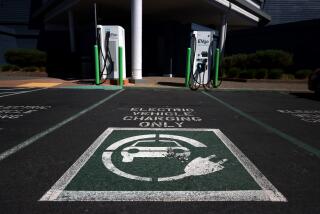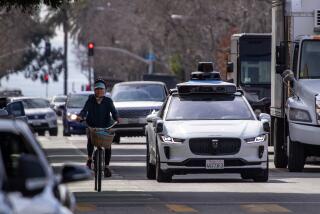Rules on Company Cars Revised, but Not Enough
- Share via
On New Year’s Day, San Diego employers and their accountants cringed at the prospect of keeping onerous mileage records to convince the federal government that company cars were being used for business.
New federal laws required drivers to keep “contemporaneous written records” each time a driver got behind the steering wheel of a company vehicle.
Although two subsequent changes in regulations by the U.S. Department of the Treasury and a simmering congressional debate have reduced the paper-work burden, drivers still aren’t free to keep both hands on the wheel and their minds on business.
And accountants, for their part, are still worried about the added paper work the regulations created.
“You can’t argue with the intent, because there were some abuses of (business car usage). But what (Washington) did was try to kill a gnat with a sledgehammer,” said one San Diego executive.
Although the original ruling required drivers to log individual trips, accountants are now advising clients to maintain simpler daily records.
That hasn’t eliminated the griping, however. “This thing is a bookkeeping nightmare, even with the modifications,” the executive complained.
“There’s still a lot of dust that hasn’t settled,” said Jerry Ringer, assistant to the president at Cubic Corp. “The last word we heard was that (the Treasury Department) had held an April 18 meeting. But there still hasn’t been any disposition of the matter, so we don’t understand exactly what is required.”
Consequently, although Cubic hasn’t changed the way it tracks car use, it has developed “sophisticated plans” in the event Washington again settles on contemporaneous record-keeping, Ringer said. “It’s taken some time and expense to comply so far,” he noted.
Although the Treasury Department has reversed its field several times, the Signal Cos. of La Jolla has maintained its existing company car-use accounting. “We’ve always kept track of personal use,” said a company spokesman. “We’ll keep doing that.”
The new regulations also bother San Diego accountants.
“The law put us in the role of policeman, which is a role we didn’t want,” said Mary Smalligan, a partner with Deloitte, Haskins & Sells’ San Diego office.
Accountants might get to turn in their badges, however, if a U.S. House-Senate conference committee can agree on a law governing company car use. That would allow the Treasury Department to again revise its regulations.
More to Read
Inside the business of entertainment
The Wide Shot brings you news, analysis and insights on everything from streaming wars to production — and what it all means for the future.
You may occasionally receive promotional content from the Los Angeles Times.










